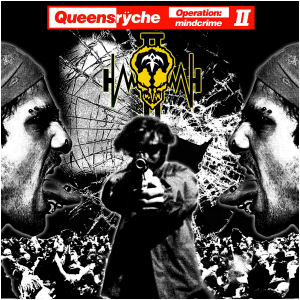Published on May 1, 2006
Let me first say that I understand why Queensryche
wanted to make this sequel to the original classic concept album.
The first Operation Mindcrime hooked me as a fan from that
faithful day that I sat in Chad Elick’s bedroom and heard the nurse
mutter, “Sweet dreams . . . you bastard” followed by the narrator
saying, “I remember how it started. I can’t remember yesterday, I
just remember doing what they told me. . .” for the first time.
I became an instant Queensryche fan. Songs like “Eyes
of a Stranger” and “I Don’t Believe in Love” took me over the edge.
I did my research, got “The Warning” and “Rage For Order” and their
4 song EP and immersed myself in the band. When Empire came
out, I bought it almost immediately and savored in the band’s
power, especially the opening track “Best I Can.” Then sometime
after Empire, I lost track of them. I listened to
Promised Land and thought the band I loved was gone. I
didn’t really pay attention to the band after that as my musical
tastes led me to other places.
Therefore, I was skeptical when I first heard that
vocalist Geoff Tate felt he had something to add to the original
story. Most likely, Tate came up with “What would happen next for
these characters?” and felt he needed to get the rest of his band
to present that story to the masses. On the surface, it makes a lot
of sense. However, like all sequels, it’s very difficult to capture
the spirit of an original masterpiece years later. Sequels can
tarnish the legend of the original and at times Operation
Mindcrime II comes close to doing so.
In general terms, Operation Mindcrime II
continues the story in the original. The guy gets out of jail and
is obsessed with finding out what has happened to his world since
he was in jail. The world has definintely changed and, basically,
he’s out for revenge. With that concept in your head, you’d think
this might be a fast-paced musical journey. Well, you’d be wrong.
Only the opener “I’m American” has an urgent tempo. I really like
this song. The tempo is fast and drummer Scott Rockenfield gets a
Master Of Puppets style snare fill that sounds awesome.
But it goes downhill after that. “One Foot In Hell”
plods along and isn’t very interesting. “Hostage” doesn’t get much
better. The mix is amazingly unclear and muddy, which is
disappointing because most Queensryche albums have a crisp sound to
them. Instead, the instruments sound like there was a blanket over
the microphone in the studio.
Then, remarkably, this release treks its way up a
long hill. Starting with “The Hands,” this release begins to sound
more like the original Operation Mindcrime sound. Vocalist
Tate hits the classic vocal style that made him a legendary metal
vocalist and either the mix becomes clearer, or my ears adapted to
the sound to pick up the individual instruments. Guitarists Mike
Stone and Micheael Wilton suddenly play some interesting solos and
riffs while Rockenfield gets some interesting parts on “Signs Say
Go.”
One of the trademarks of the first Operation
Mindcrime was the use of dialogue between the songs as a way to
tell the story. Queensryche decided not to do that as much on this
release. Instead, they use silence between the tracks “Signs Say
Go” and “Re-Arrange You,” which is interesting. Whereas the
storyline was pounded into the listener’s ears on the original,
here the story is told more through the lyrics. Therefore, it’s a
good thing that the lyrics are printed in an easy-to-read font.
There’s also silence between “Re-Arrange You” and
“The Chase.” On my first few listens, this silence annoyed me, but
now, I don’t notice it as much, and after all, “The Chase” includes
a guest vocalist appearance from Ronnie James Dio. However, when
“All The Promises” ended, I was disappointed. The lack of a
powerful ending leaves me feeling empty. Not even the way the
lyrics try to summarize the story about love and desire can do it
for me.
Now, having said all that, I have listened to this
album multiple times, and as time has gone on, this release has
gotten stronger. If you are tempted to pick up OM II, I urge
you to listen to it more than twice — probably five times is what
did it for me. The complaints I have about this release still stick
regarding muddy sound and the final track being anti-climatic
musically. I am planning to put this album aside for a couple of
months now. Only time will tell if this should have been rated
higher than the B I am giving it today.
